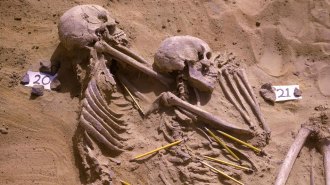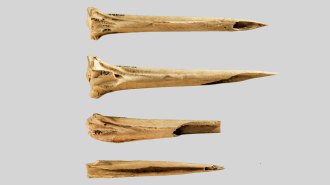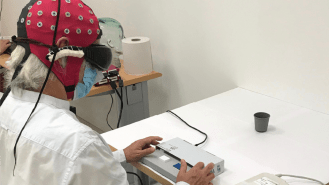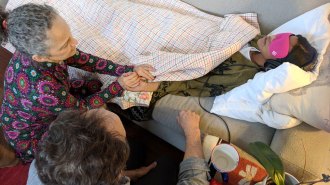Humans
Sign up for our newsletter
We summarize the week's scientific breakthroughs every Thursday.
-
 Anthropology
AnthropologyHunter-gatherers first launched violent raids at least 13,400 years ago
Skeletons from an ancient African cemetery bear the oldest known signs of small-scale warfare.
By Bruce Bower -
 Archaeology
ArchaeologyTo find answers about the 1921 race massacre, Tulsa digs up its painful past
A century ago, hundreds of people died in a horrific eruption of racial violence in Tulsa. A team of researchers may have found a mass grave from the event.
-
 Health & Medicine
Health & MedicineHere are answers to 3 persistent questions about the coronavirus’s origins
Calls to double down on investigations into where SARS-CoV-2 came from — nature or a lab accident — are rising as answers remain scarce.
-
 Neuroscience
NeurosciencePlaying brain training games regularly doesn’t boost brainpower
Comparing brain training program users with those who don’t do the mini brain workouts, scientists found no proof that the regimens boosted brainpower.
-
 Archaeology
ArchaeologyThe oldest known tattoo tools were found at an ancient Tennessee site
Sharpened turkey leg bones may have served as tattoo needles between 5,520 and 3,620 years ago, at least a millennium earlier than previously thought.
By Bruce Bower -
 Genetics
GeneticsA gene-based therapy partially restored a blind man’s vision
Light-activated proteins inserted in eye nerve cells and special goggles help the man, who lost his sight due to retinitis pigmentosa, see objects.
-
 Health & Medicine
Health & MedicineThe CDC’s changes to mask guidelines raised questions. Here are 6 answers
Experts weigh in on the U.S. CDC’s recommendation fully vaccinated individuals removing masks indoors and what it means for the pandemic’s future.
-
 Health & Medicine
Health & MedicineCleaning indoor air may prevent COVID-19’s spread. But it’s harder than it looks
The size and setup of a room and how the room is used make finding simple ventilation and filtration solutions difficult.
-
 Health & Medicine
Health & MedicineMDMA, the key ingredient in Ecstasy, eases symptoms of severe PTSD
By the end of the trial, 67 percent of the participants who took MDMA had improved so much that they no longer qualified as having a PTSD diagnosis.
-
 Animals
AnimalsThe U.S.’s first open-air genetically modified mosquitoes have taken flight
After a decade of argument, Oxitec pits genetically modified mosquitoes against Florida’s spreaders of dengue and Zika.
By Susan Milius -
 Psychology
PsychologySmall bribes may help people build healthy handwashing habits
Getting people to wash their hands is notoriously difficult. Doling out nice soap dispensers and rewards helps people develop the habit.
By Sujata Gupta -
 Health & Medicine
Health & MedicineAs the COVID-19 pandemic evolves, we answer 7 lingering vaccine questions
As U.S. vaccination efforts shift to get shots to the hard-to-reach, we take a look at some big questions about vaccines that still remain.